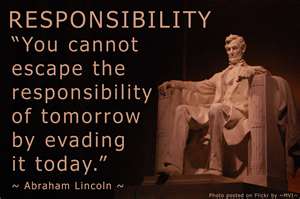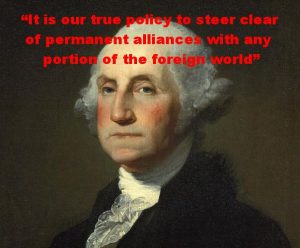 Yesterday I suggested that the United States is becoming a democracy and put forward some ideas to support that assertion. Today I’ll take on the proposition that this is a bad thing and the methods needed to stop the trend.
Yesterday I suggested that the United States is becoming a democracy and put forward some ideas to support that assertion. Today I’ll take on the proposition that this is a bad thing and the methods needed to stop the trend.
Many people with whom I speak think that the United States becoming a democracy is a good thing. They argue that the country was created as a democracy. I think this largely comes from the preamble of the Constitution of the United States.
We the People of the United States, in Order to form a more perfect Union, establish Justice, insure domestic Tranquility, provide for the common defence, promote the general Welfare, and secure the Blessings of Liberty to ourselves and our Posterity, do ordain and establish this Constitution for the United States of America.
It’s that We the People line. It does all come back to we the people but the reality is that we are a Representative Republic which I discussed yesterday.
The other main argument that I hear to support democracy is that the politicians are in place to enforce the will of the people. I’ll quote some of the founding fathers to refute this idea.
Alexander Hamilton: “Democracy was the surest path to tyranny” and “That a pure democracy if it were practicable would be the most perfect government. Experience has proved that no position is more false than this. The ancient democracies in which the people themselves deliberated never possessed one good feature of government. Their very character was tyranny; their figure, deformity.”
James Madison: “A pure democracy can admit no cure for the mischiefs of faction. A common passion or interest will be felt by a majority, and there is nothing to check the inducements to sacrifice the weaker party. Hence it is, that democracies have ever been found incompatible with personal security or the rights of property; and have, in general, been as short in their lives as they have been violent in their deaths.”
John Witherspoon: “Pure democracy cannot subsist long nor be carried far into the departments of state – it is very subject to caprice and the madness of popular rage.”
I’m a particular fan of that last one and I can’t do better than these great men. I’ll try to sum up: In a democracy the majority will always tyrannize the minority and a government’s duty is protect all its citizens, not just the majority and the flavor of the moment.
So, if what I suggested yesterday is true, that we are becoming a democracy, it seems to follow that we are headed towards a violent death as suggested by Mr. Madison.
As always, I don’t want to spend all my time complaining, pointing fingers, and otherwise acting like a modern citizen of this country. I will try to offer remedies instead of five second sound bits to enflame popular sentiment.
If this trend towards democracy threatens the United States then what solution do I offer? Certainly polling is not going away, the internet and popular sentiment directly expressed to our representatives it not going to end, so how can we arm our politicians with the courage to make the decisions that are unpopular but good for the nation?
First, on a state and local level I would start to remove all direct vote propositions. The politicians need to make the laws, not the people. If the politicians pass a law that I disagree with then I will have to harbor that for a period of time and use my outrage in the next election. By then, their wisdom might shine through my momentary passion of opposition, or not.
I would repeal the 17th Amendment which allowed for the direct election of Senators. This is a complex issue because many states were already heading toward direct election anyway. It is a topic that probably deserves an entire blog.
Finally and most importantly, we must educate people to understand the principals of our government. The ideas of a Representative Republic, the dangers of democracy, the ideals of the Founding Fathers. If the majority of people think we live in, or should live in, a democracy then the politicians we elect will think the same thing.
Do you want the laws of this nation being made in the same way your local newspapers has a popular vote for Best of (my town)? When you peruse that yearly “Best of” article do you find the winner is actually the “best of” anything? Or is it simply the lowest common denominator?
Like, Tweet, Stumble, and otherwise comment if you think other people might be interested in these ideas.
Tom Liberman
Sword and Sorcery fantasy with a Libertarian Twist


